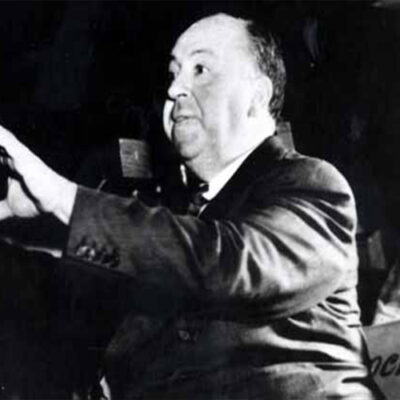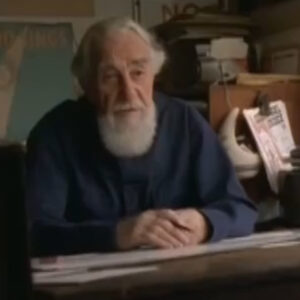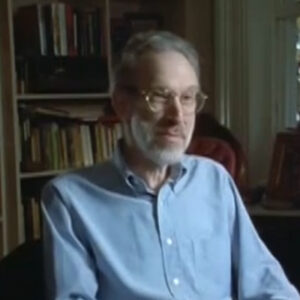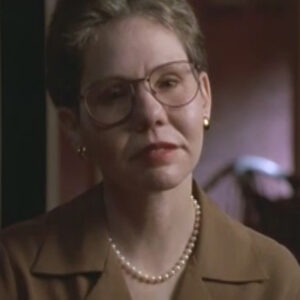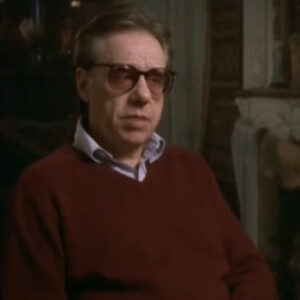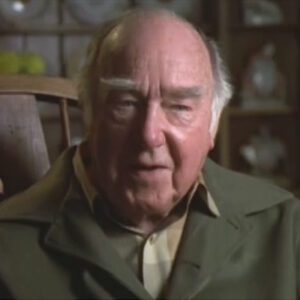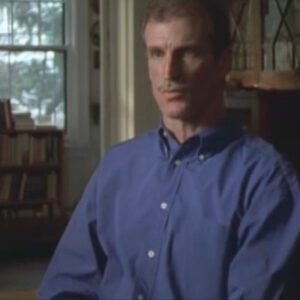Speaker Very prophetic. So, Bob, what what Hitchcocks expectation coming out is that he is that Hollywood meet his expectations of seeing him as a great artist.
Speaker No, I mean, he sees he sees Hollywood as an opportunity to be taken seriously as a filmmaker, and he thinks it’ll open up a lot of opportunities for his his career. And that does sort of happen to him. But some of his initial experiences are quite distressing to and not not happy with his with his relationship with Sosnick. He doesn’t realize that he’s work working for a mad man who was looking over him at all at all times, unlike his experience in in England, working working with with Michael Balcon. He also thinks now he’ll have access to the greatest Hollywood stars. And he does not have that experience during the first loan out when he makes a foreign correspondent. He wanted to hire Gary Cooper. And Gary Cooper didn’t want anything to do with a thriller. And he had to opt for Joel McCrea, looking back on that.
Speaker You see, he’s he’s upset that he’s getting sort of b grade people to to have to appear in his in his thrillers. I mean, that’s not his experience with with Rebecca. But he didn’t view Rebecca as a as a as a Hitchcock film. I think Hitchcock Hitchcock’s experience with with Rebecca is is complicated psychologically.
Speaker I think he he he knows that he benefited greatly from the experience of working with Selznick. But what he’s also experiencing is the the experience of external control that that is Selznick is imposing something on him that is difficult for him to to internalize. And he doesn’t internalize it immediately so that after working on Rebecca, he probably did not feel that Rebecca was really his work and it was somebody else’s work. And he hides recover in his in his next film. Foreign Correspondent is a sort of falling back on the kinds of films that he made in the in the in the late 30s. And in it it looks like one of his one of the movies from the the British Sextet. And this continues until until he makes a shadow of a doubt. And I think a shadow of a doubt is really the first significant sign that Hitchcock has learned something from Selznick. And and now it’s become internalized.
Speaker It’s become part of himself, for example, longer takes greater, greater attention to the photogenic possibilities of filming the stars and especially the heroine in share of it out of the Selznick influence surfaces.
Speaker It becomes part of Hitchcock, you know, his entire well, well, well into the 60s and 70s.
Speaker The missis dismisses Rebecca as a producer’s mission. Selznick’s. What do you think’s going on with Hitchcock in terms of his sense of Rebecca?
Speaker Why does he, even into the 60s, throw that away as a novel novel that describes.
Speaker For one thing, how does he feel about the film? To your mind?
Speaker Well, I feel that that Hitchcock felt that this was a subject matter that was not that he was not comfortable work working with her initially.
Speaker It was not an action an action thriller sort of forced him to to grapple with with the female persona in a way that he he had not before.
Speaker He wanted the Joan Fontaine character to be a lot feistier than what Selznick desired or what was really required if this was going to be a a an honest adaptation of the a novel.
Speaker But how does he feel about the film when it’s all done in your mind? Is he proud? As you see, this is the work of my authorship.
Speaker He does not view it as a as a work of his authorship. And that’s why I I I’ve been emphasizing this business of external control there. I think that the control that Selznick imposed and why and this is how Hitchcock experienced it led him to view this as a very painful chapter in his career. It’s not until a few films later that we realize that, oh, my God, he learned something from this. Something extremely valuable that was going to have significant ramifications in his in his future work.
Speaker Yeah, I want to jump Fortune Notorious. It’s the first film that this park has to produce because David Selznick is all in his madness of doing this. How do you look at it from his career? Is it the next really important film for him in that moment that he really blossoms completely?
Speaker I think before notorious film where he really blossoms is a shadow of a doubt.
Speaker And he feels very good about about that film. But if you go back and you and you examine what Hitchcock has said over the years about shadow of a doubt, shadow of a doubt is everything is plausible.
Speaker Strong characters are plausible motivation.
Speaker There is a a flow from from sequence to sequence. He could be describing Rebecca. He could be describing Rebecca. But he doesn’t. He’s describing shadow of a doubt where he’s had control over the whole process.
Speaker But it’s also the fact that by shadow of a doubt, he’s internalized something. What he what he learned from from from making Rebecca. Other thing going back to Rebecca that I think I’ve said Hitchcock, was that the film does lack a good deal of the Hitchcock trademark. He did not have the post-production input that that he enjoyed in the shadow of a doubt.
Speaker And, of course, the notorious and that editing is what it is partly responsible for, the greatness of of notorious, that really that stands as the achievements of the of the cells of the cells in a period.
Speaker The other thing about Rebecca is it does well. Right. Yes. Talk to me about the critically well, commercially right. What’s the drone nuts?
Speaker It drove me nuts because he also he he didn’t win win win an Oscar for it. The Oscar for Best Film course went went went to the producer. And that was something that that upset him. He also presented himself at the time of Rebecca as as the man responsible for all aspects of of the film. Filming of Rebecca, even the producer of it. Which, of course, was not that was not the case at all. So his his impression management gives off the impression that it is a Hitchcock film all the way. His experience making it contradicts that almost.
Speaker You can see it sort of twisting in the gut the night.
Speaker Yes, I think it was a yes. I think Rebecca was a very painful experience for Hitchcock and he never completely overcame that feeling. Look, looking back at it, I don’t think it’s just simply a question. Of Hitchcock reconstructing his his his career so that it looks to everybody that he is the auteur, but that you knew he had a a a painful experience, that that sort of. In some ways distorts how he how he viewed the film. Look, look, look. Looking back on it resents the fact that Selznick had this this this pensions to to be faithful to the original material. This went against Hitchcock’s whole aesthetic use, use somebody else’s material as a springboard for his own artistic imagination and explorations. And and this must have really, really riled him.
Speaker Something else to rouse him. Is the Association of Man Wrong in Spellbound? How do you think Hitchcock feels about having David Selznick analyst? On the set, this is this sharing credit with with an analyst. God forbid. How do you see Spellbound getting that? What do you find that at all interesting to.
Speaker Hitchcock did not have any great regard for for for psycho analysis, and that’s something that actually at one point surprised me. I had I talked to a number of years ago with with Robert Boyle, his set designer, on a number of films. And and and Boyle was adamant in conveying that that that Hitchcock was very skeptical of psychoanalysis.
Speaker Bob in 39 Hitchcocks coming over, he’s expecting a little boutique shop or he’s going to be able to run the show and Selznick’s expecting he’s going to get this British director that he’s going to be able to produce for. Is that a relationship doomed to failure? Is it a relationship doomed to disappoint the two parties?
Speaker The relationship between Hitchcock and Selznick is a relationship that is doomed to disappoint. Both parties.
Speaker Both parties are too fiercely independent and an ego driven for it, for the relationship to to really work, at least in their minds, as a as a successful collaboration. Too much.
Speaker Too much fighting.
Speaker Too too too many clashes over, you know, very basic fundamental ways of of of doing work. Hitchcock prided himself for his skills as a as a as an editor and having having a film all all worked out with.
Speaker Bob, do you think that Hitchcock cells meant that they were doomed to be disappointed by each other? I mean, were their personalities?
Speaker Just didn’t mesh very well to the.
Speaker Yeah, I think Hitchcock and and Selznick that their relationship was sort of doomed to failure. I mean, not in terms of some of the actual films that they were able to work on together that were wonderful, like like Notorious and and Rebecca. But they’re working relationships.
Speaker They’re a way of making films so, so different that it was inevitable that they would clash. Hitchcock did magic in in in post-production, but not the kind of magic that post-production was required for for Selznick.
Speaker Selznick always would shoot way more footage than he needed. Hitchcock knew ahead of time, through careful planning what he what he wanted and still putting it together in post-production often led to to magic and surprises. And that was deprived of him, especially during Rebecca.
Speaker Great. Coming forward now to the end of the round all the way seven years later. It’s it’s he’s entering the parody case. This is not a film that probably really wants to make very much. How do you think Hitchcock’s viewing sells? Forty five. Forty six.
Speaker He’s had. Really. Is it was Sidney Bernstein or is it with David Sells, Hitchcock is.
Speaker Is is is is is thinking about about his future.
Speaker He’s thinking about being a independent producer. His mind is not. And his his work obligations with with Selznick High in the in the late 40s and early 50s, he goes into an independent independent production with with with mixed results.
Speaker But if I can put you back to 46, he’s he’s gotten something out of that relationship other than some films and other than a house in Bel Air. He can now be an independent. He got what he needed. Right. He got that measure of respect that he came to America for. Is that right or do you disagree?
Speaker Do you think he’s still a yokel, that he’s still not considered a good filmmaker, that nobody’s ever gonna want to work in forty six day consultants?
Speaker After his his is Peery with David Selznick. Hish Hitchcock. He has great respect within within the film industry, but he still does not have the kind of respect that he needs from from the critical stage establishment. Certainly, the parodying case did not help his hit his reputation. He had actually a lot of ups and downs during during the 40s.
Speaker Films were his films for a very, very mixed reviews. He had trouble with his British compatriots. The British critics dumped on him for selling out to Hollywood. And even though you received some very favorable reviews from the American press, the British press felt that he had let them down by going to Hollywood to work. So what turns it around? One of the things that turns it around for Hitchcock is, is the his agent, Lew Wasserman, in the 50s, who is able to get Hitchcock a very attractive deal at Paramount. And the fact that Hitchcock is able to deliver with the first film of that arrangement, Rear Window, a huge success, both commercially and critically. And what really stands out among critical assessments of their film as a Hitchcock sort of return to the Hitchcock of the Thirties, even the critics are in some way ambivalent about the films that Hitchcock made under under Selznick, with the possible exception of Notorious. But what they liked about the window was a sense of humor.
Speaker A sense of humor was in short supply in the Selznick film. Those films are dark and and gothic. The films that Hitchcock made in the late 30s were thrillers, but at least with with with with humor.
Speaker And do you see that in Rear Window? No touch of Selznick. No hint that so that seldom ever worked with.
Speaker There’s no question that there is at the time that Hitchcock that had worked with Selznick since one of the characters in Rear in the Window, the murderer is a Selznick lookalike. And again, here, you know, Hitchcock is not able to get Selznick out of his out of his system, but also in Rear Window. The cinematic properties of the film are a.
Speaker Are an offshoot of Hitchcocks experiences working working with Selznick.
Speaker The attention to the subjective side of the care of a character, trying to explore the the the inner life and to tap that that inner life through through through text to through technical means. I think Hitchcock is much more attuned to that as a result of his his tenure with with Selznick.
Speaker How important is the television program to our sense for the television program?
Speaker Reinforces this new view of of Hitchcock as a popular entertainer that begins with the enormous success of over a window and after a window sequence of films that he made it paramount to catch a thief. And at roughly the same time, the television series of appears and his public appearance, his his introductions to the to the show reinforce this view of him as a as a as a popular entertainer.
Speaker He becomes a household word. He becomes a household term, and he becomes in time the real star of his of his films.
Speaker He becomes a kind of superstar by the time of Psycho. In 1960, here’s a film with no major stars. I mean, Janet Leigh is the closest thing to a star in the film, and she, of course, is knocked off after a third of the way into the film. But all the publicity and promotion for the film emphasizes Hitchcock, the director Hitchcock, responsible for for all aspects of that of that film, a film, incidentally, that Hitchcock was very nervous about.
Speaker Hitchcock is a star like Hitchcock as a star Psycho. Hitchcock is the star. Hitchcock is the star of Psycho.
Speaker One that. I didn’t cover that, did I?
Speaker OK, everybody, quiet. Who’s the star of.
Speaker Well, Hitchcock is the star of Psycho.
Speaker It’s sort of a new new dynamic, right? The director is star. The director is star. How much is Hitchcock a part of his own reassessment? Because in some ways, after Psycho, after North by Northwest, he’s seen as a commercial director, but not as an artist.
Speaker Well, during during during the 50s, he’s working very hard to corral Jetton, the general public to to his films. And he’s very successful at this. But at the same time, he is upset with the fact that the serious critics are not taking him seriously as a as as a filmmaker and psycho. He took very seriously himself and was very disappointed with the initial lukewarm reception, while actually lukewarm, is sort of a lukewarm way of of of capturing the critical climate at the time. Saikat was released. Many of the critics were furious with Hitchcock making this film. This Bosley Crowther of The Times was furious with this film that Hitchcock would stoop so low.
Speaker And yet very quickly, there’s a reassessment of Psycho and when a couple months, partly, I think, also a reflection of its enormous success at the box office. Critics like Bosley Crowther are writing to Hitchcock and apologizing for their their lack of understanding of what he was doing. Also at that time, some of the French critics writing very favorably about that psycho. A few scattered American critics like Andrew Sarris consider this one of the greatest films, American.

